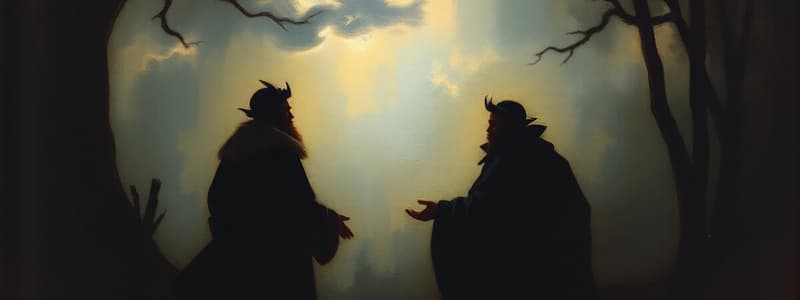Podcast
Questions and Answers
What does Lady Macbeth mean by 'Nought's had, all's spent'?
What does Lady Macbeth mean by 'Nought's had, all's spent'?
- They have gained nothing despite the cost. (correct)
- There is still hope for future gains.
- Everything she desires has been achieved.
- She is satisfied with the outcomes.
What emotion does Macbeth convey when he describes his mind as 'full of scorpions'?
What emotion does Macbeth convey when he describes his mind as 'full of scorpions'?
- Anguish and turmoil. (correct)
- Peace and contentment.
- Curiosity and intrigue.
- Joy and celebration.
Why does Macbeth suggest that it is 'safer to be that which we destroy'?
Why does Macbeth suggest that it is 'safer to be that which we destroy'?
- He is contemplating their next move.
- He feels regret for their actions.
- He believes it's better to be dead than live in fear. (correct)
- He wants Lady Macbeth to feel more secure.
What does Lady Macbeth mean by 'Using those thoughts which should indeed have died'?
What does Lady Macbeth mean by 'Using those thoughts which should indeed have died'?
What is Lady Macbeth's advice to Macbeth about his demeanor at the banquet?
What is Lady Macbeth's advice to Macbeth about his demeanor at the banquet?
What psychological state does Macbeth suggest when he says 'But let the frame of things disjoint'?
What psychological state does Macbeth suggest when he says 'But let the frame of things disjoint'?
What does Macbeth indicate by stating 'Duncan is in his grave'?
What does Macbeth indicate by stating 'Duncan is in his grave'?
What does Lady Macbeth imply when she tells Macbeth to 'Come on; gentle my lord, sleek o'er your rugged looks'?
What does Lady Macbeth imply when she tells Macbeth to 'Come on; gentle my lord, sleek o'er your rugged looks'?
What does Macbeth mean by 'Ere the bat hath flown his cloistered flight'?
What does Macbeth mean by 'Ere the bat hath flown his cloistered flight'?
What is the significance of Macbeth wanting to keep Lady Macbeth 'innocent of the knowledge'?
What is the significance of Macbeth wanting to keep Lady Macbeth 'innocent of the knowledge'?
Flashcards
Macbeth's Guilt
Macbeth's Guilt
Macbeth feels intense remorse and guilt after killing Duncan, manifested by his tormented sleep and psychological distress.
Lady Macbeth's Advice
Lady Macbeth's Advice
Lady Macbeth urges Macbeth to control his emotions and appear cheerful, particularly towards Banquo, in order to maintain their façade.
Fear and Sleep
Fear and Sleep
Macbeth's guilt and fear make him unable to sleep soundly and experience nightmares, highlighting the psychological consequences of his actions.
Duncan's Safety
Duncan's Safety
Signup and view all the flashcards
Banquo's Threat
Banquo's Threat
Signup and view all the flashcards
Lady Macbeth's Disdain for Nature
Lady Macbeth's Disdain for Nature
Signup and view all the flashcards
Macbeth's Plan
Macbeth's Plan
Signup and view all the flashcards
Lady Macbeth's Role
Lady Macbeth's Role
Signup and view all the flashcards
Night's Symbolism
Night's Symbolism
Signup and view all the flashcards
Bond of Guilt
Bond of Guilt
Signup and view all the flashcards
Study Notes
Lady Macbeth's Concerns
- Banquo, a threat to Macbeth's ambition, is still alive, and returning to court tonight.
- Lady Macbeth worries about Macbeth's distress.
- Macbeth's guilt and anxiety are evident in his thoughts of death, dreams, and the lingering threat of Banquo.
- Macbeth feels the act of regicide is unremedied
- Macbeth realizes that killing Duncan, although effective has not eradicated the threat
- Macbeth is troubled by guilt and foresees additional suffering from lingering fears of Banquo.
Macbeth's Response to Lady Macbeth
- Macbeth, acknowledging the threat Banquo poses, devises a plan to eliminate him.
- Macbeth wants Lady Macbeth to remain cheerful and not show their inner turmoil.
- Macbeth emphasizes the necessity of a cunning facade to conceal their guilt and ambition from their subjects and guests
- Macbeth desires to achieve a comforting and deceptive appearance for their upcoming guests
- Macbeth's state of mind is described as being full of worry about Banquo.
- Macbeth insists that the murder must be committed before the arrival of dawn, while the natural order is still in darkness.
The Plot to Kill Banquo
- Macbeth plans another murder, this time targeting Banquo and his son Fleance.
- Lady Macbeth assures Macbeth that killing Banquo is achievable; yet still she is apprehensive.
- Macbeth argues that Banquo and Fleance are vulnerable targets.
- Macbeth and Lady Macbeth agree to secrecy and concealment of their schemes.
Setting and Atmosphere
- The dialogue demonstrates a sense of urgency and the impending nature of the plot.
- The play builds a dark tone with imagery of night and shadows, reflecting the characters' inner anxieties.
- The imagery of night highlights the morally corrupt state of nature and the characters.
- References to the natural world (e.g., crows, beetles, and darkness) add to the foreboding atmosphere.
Studying That Suits You
Use AI to generate personalized quizzes and flashcards to suit your learning preferences.
Description
Explore Lady Macbeth's worries about Banquo's threat and Macbeth's guilt after Duncan's murder. Understand Macbeth's plans to eliminate Banquo and the couple's efforts to maintain a façade of normalcy. This quiz delves into the psychological complexities of ambition and fear in Shakespeare's 'Macbeth'.



